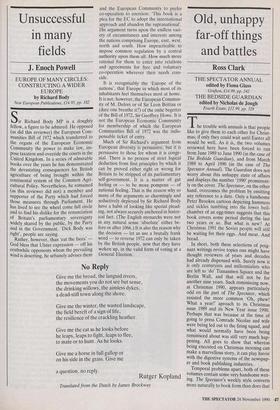Unsuccessful in many fields
J. Enoch Powell
EUROPE OF MANY CIRCLES: CONSTRUCTING A WIDER EUROPE by Richard Body
New European Publications, 04.95, pp. 182
ir Richard Body MP is a doughty fellow, a figure to be admired. He opposed (as did this reviewer) the European Com- munities Bill of 1972 which transferred to the organs of the European Economic Community the power to make law, im- pose taxation and override the courts in the United Kingdom. In a series of admirable books over the years he has demonstrated the devastating consequences for British agriculture of being brought within the continental system of the Common Agri- cultural Policy. Nevertheless, he remained (as this reviewer did not) a member and supporter of the Party which had forced those measures through Parliament. He has lived to see the wheel come full circle and to find his dislike for the renunciation of Britain's parliamentary sovereignty widely shared by the public, by the Party and in the Government. 'Dick Body was right', people are saying. Rather, however, than 'eat the faces' — God bless that Ulster expression — off his ersthwhile opponents whom the prevailing wind is deserting, he urbanely advises them and the European Community to prefer co-operation to coercion: 'This book is a plea for the EC to adopt the international approach and abandon the supranational'. His argument turns upon the endless vari- ety of circumstances and interests among the nations comprising Europe, east, west, north and south. How impracticable to impose common regulation by a central authority upon them all. How much more rational for them to enter into relations and agreements for free and voluntary co-operation wherever their needs coin cide.
It is recognisably the 'Europe of the nations', that Europe in which most of its inhabitants feel themselves most at home. It is not, however, the European Commun- ity of M. Delors or of Sir Leon Brittan or (dare one breathe it?) of the onlie begetter of the Bill of 1972, Sir Geoffrey Howe. It is not the European Economic Community for membership of which the European Communities Bill of 1972 was the indis- pensable ticket of entry.
Much of Sir Richard's argument from European diversity is persuasive; but it is persuasive to those for whom it is conge- nial. There is no process of strict logical deduction from first principles by which it can be proved either right or wrong for Britain to be stripped of its parliamentary self-government. It is a matter of gut feeling or — to be more pompous — of national feeling. That is the reason why so many of the arguments so charmingly and seductively deployed by Sir Richard Body have a habit of looking like special plead- ing, not always securely anchored in histor- ical fact. (The English monarchs were not in any natural sense 'absolute' either be- fore or after 1066.) It is also the reason why the decision — let us use a brutally frank word — to reverse 1972 can only be taken by the British people, now that they have woken up, in the valid form of voting at a General Election.


































































 Previous page
Previous page